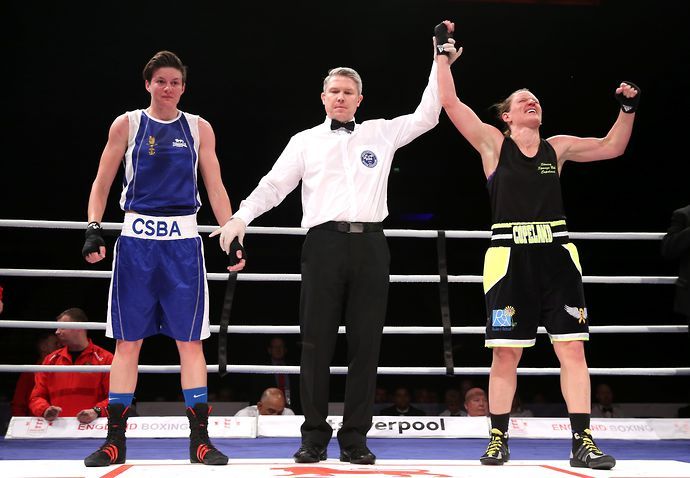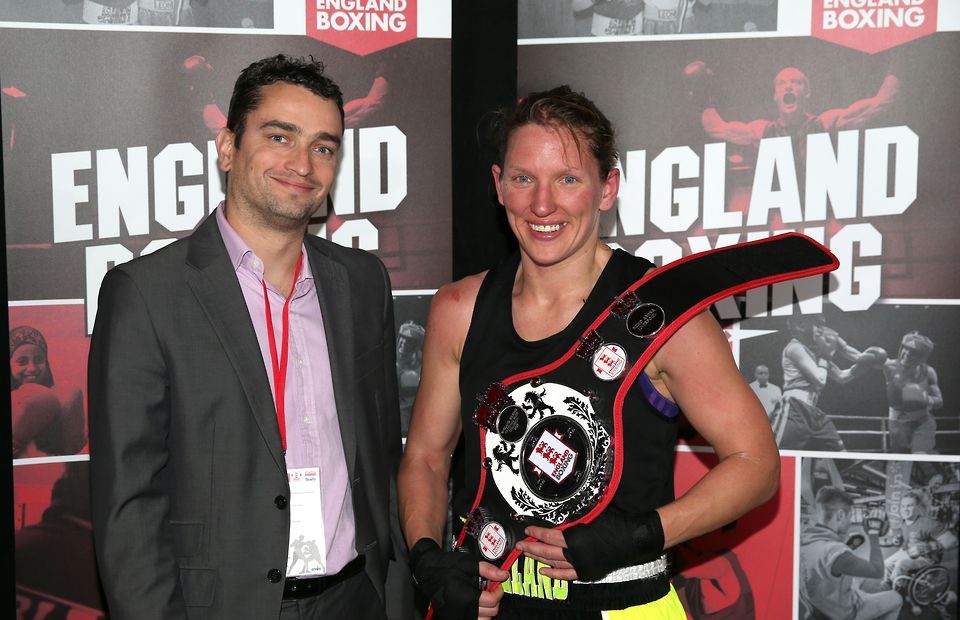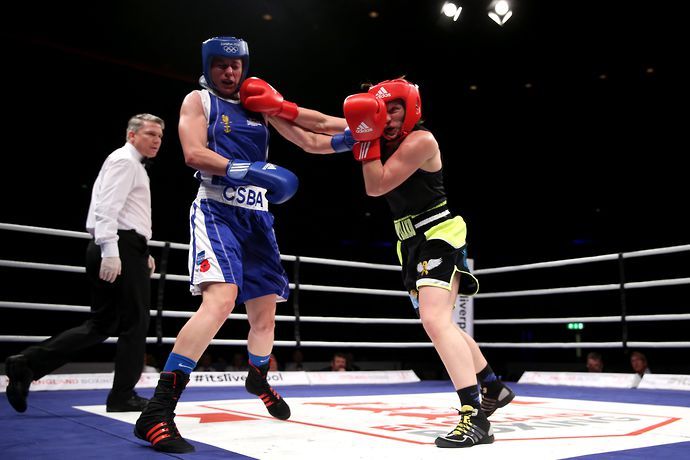It’s one thing to excel in one sport, but it is another thing to succeed in two. Add on the countless barriers that women in sport often face, and it becomes even more of an exceptional achievement.Yet, there have been the likes of Katie Taylor, Dame Sarah Storey and Stacey Copeland who have done it, and done it well.For Copeland, it was a dream which even she thought was impossible to reach, and understandably so.As a young girl, boxing wasn’t an option. It had been made illegal for women to box competitively in England, a ban which lasted up until 1996. Copeland’s cherished football, too, was only just waking from a slumber following a 50-year ban from the FA on women participating in the sport.But Copeland eclipsed these drawbacks with her sporting success. She has a Commonwealth title to her name in professional boxing, along with three national titles and a European silver medal as an amateur. In football, she played for Tranmere Rovers and Doncaster Belles, reaching an FA Cup final, and also spent time with teams in the United States and Sweden. GiveMeSport Women dives into Copeland’s career, dissecting the challenges she faced, how she balanced the desire to compete in two different sports, and how she thinks attitudes towards women’s sport have changed for the better.Always sporty as a child, Copeland had given things like gymnastics and squash a try. In her heart, however, there was room for only two sports.“There was nothing at all like football and boxing,” she says.Boxing runs through Copeland’s blood. Her dad, Eddie, was a boxer and became Stacey’s trainer, and her grandfather ran a boxing gym.“I loved everything about the boxing gym. I loved the sounds, the hard work, the camaraderie with everybody in there,” she explains.“In terms of football, I just absolutely loved playing with all the lads at playtime and lunchtime at school but then equally, I’d be very happy out in the garden for hours upon end on my own.
GiveMeSport Women dives into Copeland’s career, dissecting the challenges she faced, how she balanced the desire to compete in two different sports, and how she thinks attitudes towards women’s sport have changed for the better.Always sporty as a child, Copeland had given things like gymnastics and squash a try. In her heart, however, there was room for only two sports.“There was nothing at all like football and boxing,” she says.Boxing runs through Copeland’s blood. Her dad, Eddie, was a boxer and became Stacey’s trainer, and her grandfather ran a boxing gym.“I loved everything about the boxing gym. I loved the sounds, the hard work, the camaraderie with everybody in there,” she explains.“In terms of football, I just absolutely loved playing with all the lads at playtime and lunchtime at school but then equally, I’d be very happy out in the garden for hours upon end on my own.
“Football and boxing were accessible, available, affordable and I just loved them. So that was that.”
Yet, a young Copeland didn’t realise that her two most favourite things were only readily accessible and available to one gender.
“When I got to the age of 11 and I found out it was illegal for girls to box then I knew I was going to go into football and totally focus on it because there wasn’t an avenue for me to compete in boxing back then.”
But there wasn’t much of a pathway in football either, as Copeland elaborates: “In football, the FA didn't recognise girls and women's football when I was at primary school. So in the ‘80s, when I was at school, there weren't any girls teams or leagues or anything like that.”
Copeland played for her school team, but after parents and coaches realised there was a girl playing, they made their distaste known with offensive shouts hurled across the pitch. With the help of her mum and a pair of scissors, she continued to play for her school side with shorter hair – pretending to be a boy.
Copeland admits, even with the legal barriers and the negative attitudes, she could not be put off her beloved boxing and football.
“I was a very driven kid, I had a very deep passion for sport,” she says. “However, it did, for many years, make me feel like what I was doing wasn’t important.
“The whole narrative that I had my whole life had been girls shouldn’t be playing football, it’s not even legal for them to box, girls are not as good and they’re not as capable. They don’t deserve the same respect, they’re not valued in the same way.
“Every law, policy, attitude, media outlet, you name it, reinforced that message again and again.”
Despite that message, football and boxing stayed at the forefront of Copeland’s life, as she balanced the two alongside working or studying full-time.
“I would never have done my boxing training if it compromised football though, absolutely not. When I took up boxing properly, I didn't let football compromise that vice-versa either,” she reveals.
“I only ever focused on one, the other was just a supplement and I would never have compromised, but juggling it all, either sport, with work was always very difficult.”
Copeland’s plans to take up boxing started before her time with football ended. A broken leg and a missed penalty were the catalyst.
Her outlook on football was transformed in her final year of college in Texas, when – after working hard to get back to full fitness – she missed the all-important penalty which resulted in her team’s exit from the national college championships.
“It was one of the worst heartbreaks of my entire life actually, not just my sporting career,” Copeland says. “Something changed in me forever about football. I just knew I’d never feel the same about it ever again.”
But the idea of a future boxing career helped Copeland stay positive during a dark period following that season: “That was the thing that made me feel there was still something to keep going for.
“I couldn’t quite settle that I’d never had the opportunity to box and do it and live that dream.”
However, the idea of a fight once every couple of months, compared to a match at least once a week, concerned Copeland when she switched sports at the age of 29.
“When I was first transitioning from football to boxing, I thought ‘I wonder if I could do both?’
“Once I got into boxing it was all consuming. It completely took over my life more than football had ever done,” she adds. “I realised you need all those weeks in between to make weight, get yourself prepared for the fight and taper, and be the very best. So it didn't feel like the big gaps that I anticipated it would be.
“As soon as we got into it [boxing] properly, I knew it was completely impossible to do both if I was going to really commit myself and achieve everything I could in the sport of boxing.”
So what did Copeland carry with her from football into boxing? Of course, she had the physical attributes needed to succeed as she revealed she has always liked pushing her body to the limits.
“I really enjoy pushing myself to the point where I feel like I might die or be sick, whichever comes first,” the former athlete jokes.
But football also prepared Copeland for the mental setbacks she would face in boxing. She gives a long list of obstacles she experienced whilst playing: “Dealing with injuries, dealing with being away from home, dealing with setbacks, big losses and having your dreams shattered.
“Having been through that stood me in good stead. I started a sport with a toolkit of how to deal with what was to come.”
This didn’t mean that Copeland was without nerves heading into competitive boxing, and whilst there were some outsiders who wondered why she was changing sport at 29-years-old, the majority of pressure came from herself.
“This was something I’d wanted to do since being a very little girl, running around the kitchen I’d used to cut the end of a cucumber and make my own gumshield.
“I’d waited all my life to have the opportunity to box, I wasn’t then going to let nerves cock it up for me or get in the way.
“But I believed in myself and I really thought that if I gave everything and worked hard, I could do something in the sport and I did.”
And, by the time Copeland had diverted to boxing, she was aware of the influence of role models and wanted to pave the way for other girls and women entering the world of sport.
Since retiring from competitive sport, inspiring the next generation is at the centre of Copeland’s core beliefs.
In 2017, she set up a project named ‘Pave the Way’, which hopes to stop gender from becoming a barrier to human potential, within sport or otherwise. She continues to use her voice in public speaking at events, talking about her experiences in football and boxing, and gender equality.
“I can’t help but feel anything but massively optimistic and positive about women’s sport,” Copeland states.
“No matter whether you like it or not, whether you think it’s good or not - I’m not interested.
She continues: “There’s an enormous momentum now of young girls coming through and women who are already there now who are developing and are already in positions of power.
“Every room that we can be in, we are in. Not as the majority, but we’re in them, and we’re not leaving them. Women’s sport can and will only get bigger and that is hugely exciting, and I couldn’t have been sure of that years ago. Now I am.”




















